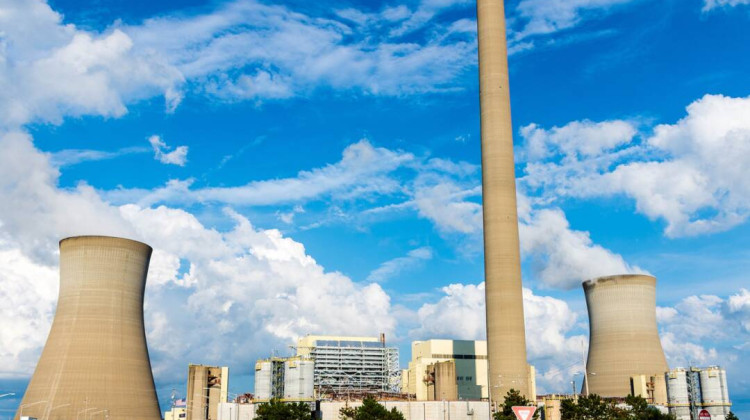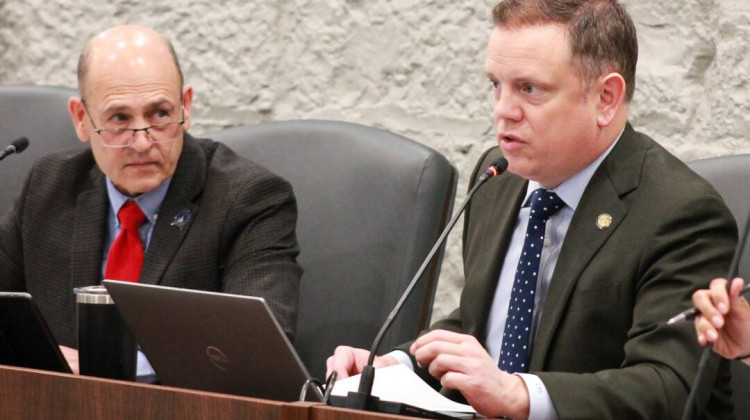
State Rep. Sharon Negele (R- Attica) speaks during a forum about water use in Tippecanoe County hosted by the League of Women Voters of Greater Lafayette on Monday, June 26, 2023 at the Tippecanoe County Fairgrounds.)
Ben Thorp / WFYIState officials are considering rerouting water from Tippecanoe County down to Lebanon for a planned industrial complex.
During a public forum on Monday, local officials and experts expressed concerns about sustainable water use in Tippecanoe County. Boone County doesn’t have enough water to meet the needs of the kinds of manufacturers Lebanon hopes to attract.
The state’s plan to route water south has raised the eyebrows of local officials worried about what that could mean for the west-central region’s supply. Proposals have included piping over 100 million gallons of water to Lebanon every day.
Tippecanoe County Commissioner Tom Murtaugh said that he understands the development at the Limitless Expansion/Advanced Pace, or LEAP, district in Lebanon is important for the state.
“We’re not opposed to the LEAP project,” he said. “This type of mega site is important for Indiana economic development. Our concerns are simply that we need to have assurances that it will not have a negative impact for our county or our region.”
The proposal calls for water to be drawn from the Alluvial Aquifer in Tippecanoe County. That aquifer is not directly connected to the aquifer that both West Lafayette and Lafayette draw from but experts say it is unclear whether the two aquifers could impact one another.
Jane Frankenberger,a professor of Agricultural and Biological Engineering at Purdue, was one of several researchers who gave brief explanations of the science behind the withdrawals and the Alluvial Aquifer. Frankenberger emphasized the importance of an analysis of whether such water withdrawals would have any negative impacts on the region.
“The question that everyone has is will water withdrawn for this pipeline affect current users?” she said. “That would include both the large water users like Lafayette or some of you may have small private wells at your home.”
Frankenberger also noted that if the pipeline were connected to the Great Lakes the withdrawal would not be allowed because of the Great Lakes Compact — which requires that all water use from the five lakes stays within the Great Lakes basin.
Scott Walker, President and CEO of Greater Lafayette Commerce, said the region does not have the space for large-scale industrial sites, like LEAP.
“And actually most counties around the state don’t have a 1,000-acre site that’s ready and available for an industrial user and that’s why the state has identified the need for this mega-site in Lebanon,” he said. “So they realized there were projects that were happening we could not compete for.”
Eli Lilly is the first,and so far only, company to break ground in the proposed Lebanon industrial district. The Indianapolis-based company announced a $3.7 billion dollar manufacturing facility in Boone County earlier this year.
The district is also being considered for a $50 billion dollar semiconductor plant, according to a recent report from the Indianapolis Business Journal.
State Rep. Michael Aylesworth (R-Hebron) and Rep. Sharon Negele (R-Attica) introduced legislation (HB 1556) during the most recent General Assembly to try and create a permitting process around large water withdrawals.
“We found there was a deficit within the code in really addressing this issue,” Negele said.
Large water withdrawals have to be reported if they are over 100,000 gallons per day. But there are no state requirements that an analysis is done on the impacts of water rerouting before those withdrawals begin.
Negele noted that the only point where the Department of Natural Resources can step in is after a community can show that withdrawals are causing harm.
The Indiana Economic Development Corporation did not attend the event but Rep. Negele read a statement from the group following her comments. Negele said the IEDC was aware of the community's concerns and was working to complete an analysis of the feasibility of the Alluvial Aquifer for withdrawals.
“This analysis should be completed later this summer, at which point we’ll be proactive in sharing its results,” the statement reads. “We are also planning to share the results with independent experts for verification and to make sure there is broad consensus around whether or not the system can support withdrawals.”
“It is our vision that this project will benefit a much larger area than just Boone County and central Indiana,” the statement continued. “We hope it provides an opportunity to provide water to communities up and down the pipeline route and possibly serve future growth needs of Greater Lafayette.”
The forum was held by the League of Women Voters of Greater Lafayette at the Tippecanoe County Fairground. During a question and answer portion speakers were asked if the valve to Lebanon would be closed if there was a drought event impacting Tippecanoe County.
After the question was read the crowd of several hundred attendees broke into applause.
 DONATE
DONATE








 Support WFYI. We can't do it without you.
Support WFYI. We can't do it without you.